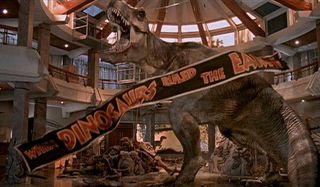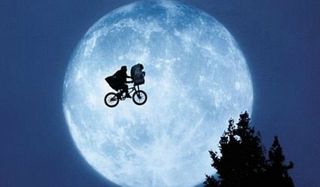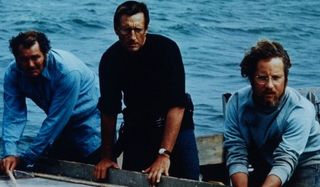Steven Spielberg's 10 Best Movies, Ranked

The release of Jurassic World and its record-breaking splash at the box office over its opening weekend has been tinged with nostalgia. Just over 22 years ago, Jurassic Park was having the same almighty impact in cinemas across the world. Which is hardly surprising. Because, as we’re all aware, Steven Spielberg is a master filmmaker. And because of his sterling career, his name is now as synonymous with cinema as Messers. De Mille, Hitchcock, and Chaplin's. So to celebrate just how bloody potent Steven Spielberg is behind the camera, we’ve decided to honor the bearded luminary with our top 10 favorite Steven Spielberg movies.
And while we’re all almost certainly going to disagree on the precise order of this listing, we can all unanimously agree that the man sure knows how to direct the heck out of a feature film.

10. War Horse
Straight off the bat I’m going to guess that War Horse probably isn’t the most popular choice to be on any top 10 Spielberg list. But just hear me out.
For me, War Horse is Spielberg at his schmaltzy best. But, rather than being embarrassingly sentimental it’s heart-breaking, resonant and gloriously shot with his usual flair. Spielberg also ekes out wonderful performances from his magnificent cast, which includes Tom Hiddleston, Benedict Cumberbatch and Toby Kebbell, each of whom were subsequently propelled up the Hollywood echelon because of their involvement.
Meanwhile its 2-and-a-half-hour running time flies by because of Spielberg’s elegant and subtle structuring, and even though it comes close to going over the top Spielberg never threatens to let it boil over into melodrama and he utilises his vast arsenal of tools to keep War Horse enthralling.
In fact, Entertainment Weekly’s Liza Schwarzbaum summed War Horse up perfectly by describing it as a mixture of the war-torn heroics of Saving Private Ryan with the boyhood point-of-view and childish yearnings of E.T.
CINEMABLEND NEWSLETTER
Your Daily Blend of Entertainment News

9. Duel
First time filmmakers aren’t supposed to deliver such competent pieces of work as Duel. Glowingly rustic and sand-swept, it tells the tale of Dennis Weaver’s aggravated middle-aged salesman as he tries to drive through the Californian desert, only to be constantly interrupted by an unseen truck driver that is blocking his path.
It’s a plot that should prove to be entertaining and engrossing for about 30 minutes before dovetailing into repetition. But Spielberg manages to keep Duel riveting for its full hour and a half running time thanks to his claustrophobic shots and patient build-up, which draws you further and further into this peculiar cat and mouse chase. Then he punctuates the film with bombastic action and set-pieces that are hugely impressive considering the film’s meager $450,000 budget.
Aged just 24 when he directed it, Spielberg’s skill behind the camera was so prevalent that even though it was originally intended to be a TV movie, Duel ended up being released around Europe and overseas, while it even enjoyed a short stint in US cinemas, too. It was almost as if he was born to be a feature film director.

8. Lincoln
Dense, dirty and proudly dialogue driven, Lincoln is unabashed in its depiction of the political machine, while at the same time masquerading as an Abraham Lincoln biopic.
With Lincoln, Spielberg actually doesn’t deliver the same visual flair that we’ve been accustomed to seeing throughout his career. Instead, he replaces this with a more relaxed and patient approach that brings Daniel Day Lewis’ wondrous leading performance and Tony Kushner’s heavy script to the fore.
Rather than trying to give us a definitive look at Abraham Lincoln’s entire life, Lincoln focuses on the key political fight towards the culmination of the Civil War, which enabled the Emancipation Proclamation to be invoked and unchallenged once the fighting ended.
Unfortunately for the casual viewer, this means that you really have to pay attention to every frame and line of dialogue as Lincoln challenges the audience to keep up. Subtly sumptuous, perfectly cast, and wonderfully immersive, Lincoln is so full of material and detail that it lasts with you for days.

7. Close Encounters Of The Third Kind
Steven Spielberg’s first foray into the world of sci-fi is cynical, but still dreamy, and a rare example of a Spielberg film that he wrote and directed which also proved to be a hit.
Spielberg once again teamed up with Richard Dreyfuss (the pair had just worked on Jaws together) for Close Encounters, which suggested that the human race’s first contact with aliens would be a peaceful one rather than the end of humanity. Which was a rare and frankly dull concept for Hollywood to approach.
But Spielberg brings this to life by combining a mainstream plot with dank and engrossing characterization, as Ray’s pursuit of aliens leads him further and further away from his family. There is a parallel between Spielberg’s real-life pursuit of all things cinema and Dreyfuss’ protagonist, which suggests that he’s the most personal character the director’s ever put up on the big screen.
Deeper than Star Wars, more personal than Jaws, Close Encounters is a perfect combination of special effects, acting and visual pomp, and a joyous cinematic experience.

6. Schindler’s List
Steven Spielberg’s most ambitious and weighty effort, Schindler’s List combines art with the horrifying re-telling of the atrocities of the Holocaust in an unflinching and engrossing style.
Spielberg was well aware of just how fraught and controversial Schindler’s List would be even before he signed on to direct it. In fact, before he confirmed he’d oversee the film, Spielberg offered it to numerous other directors. Spielberg eventually decided to direct, and embraced the melodramatic aspect to Schindler’s story, which he then boldly exploited to truly ram home the staggering horrors that took place.
Spielberg’s glorious and intimate direction is complimented by outstanding performances (especially the tyrannical Ralph Fiennes), and a terrific, slow-burning script. All of these facets combine to make an emotional, direct and culturally relevant piece that was, and still is, unlike anything else that mainstream Hollywood has ever produced. What’s even more impressive is that Spielberg made Schindler’s List at the same time as Jurassic Park! Staggering.

5. Saving Private Ryan
The hand-held camera technique was used in cinema before Saving Private Ryan. But Steven Spielberg’s virtuoso use of the device in his depiction of the Normandy Invasion is so intense and vibrant that he makes it seem pioneering.
This opening sequence is regularly cited as one of the greatest battle scenes in the history of cinema. And it speaks volumes for the rest of Saving Private Ryan that it simply doesn’t deflate under the sheer magnitude of the film’s first 24 minutes. Instead, with Tom Hanks at the fore, Saving Private Ryan remains captivating, and while its portrayal of war was so realistic it saw veterans leaving the cinema for fear of PTSD, it never glamorizes these deaths.
In many ways, Ryan re-defined the genre, but it’s also soaked in the traits of its predecessors thanks to its visceral patriotism and emotion, all of which you can’t help but become enveloped by. This is Spielberg at the peak of his powers, and it’s a film that only he could have made.

4. E.T. the Extra-Terrestrial
E.T. is fun for the whole family. Put it on, and your five-year-old niece will get as much joy out of it as your 84-year-old grandfather. In fact, it’s so perpetually timeless that you can imagine the same being said 100 years in the future.
E.T. also possesses all of the hallmarks of a Spielberg classic, to the point where it can probably be considered the most "Spielbergian" film from his oeuvre. There’s divorce, loneliness, aliens, and an absent father, all of which are shown to us from the point-of-view of a child. But it’s so poetically created that anyone of any age is immediately enchanted.
It’s almost developed a mythical status, too, and to think of cinema before E.T. is to think of theatre before Death Of A Salesman and television before The Sopranos. You know it existed, but you can’t quite picture how. It’s exciting and touching, and Spielberg seems to know exactly where to place the camera to get the full effect. This all gloriously seams together to create the sort of film that is so appealing, charming and gleeful that it could make even the most fervent of foes best buds.

3. Raiders Of The Lost Ark
Simply put, Raiders Of The Lost Ark is the most fun you can have in a cinema without getting arrested. It has pretty much everything. Laughs, action, tension and romance, and it’s created in such a concise and simplistic fashion that you find yourself even more engrossed because of how rushed and rugged it is.
After various issues shooting 1941, Spielberg decided to go back to basics for Raiders. He’d only shoot 3 or 4 takes for one scene, costs were kept down at every opportunity, and camera trickery, animation, and miniature models were used for special effects. This approach gives the film a quirky and dirty feel that sets it apart from the other more glamorous and clean-cut blockbusters of its era.
Harrison Ford as Indiana Jones is effortlessly magnetic, and while the action set-pieces are cartoonish they still teem with danger. By Raiders’ conclusion, you’re not just exhausted and thrilled, but you’re also fully aware that you’ve just seen blockbuster cinema delivered in the most entertaining way imaginable.

2. Jurassic Park
While Raiders is Steven Spielberg’s most entertaining blockbuster to date, Jurassic Park is his most spectacular, precise and audacious. Spielberg’s combination of ground-breaking special effects with cinematic tricks and a resonant sub-plot makes you think that Jurassic Park could legitimately exist at the end of your street.
He also fills the screen with a natural dread, and allows the set pieces to develop in a patient and organic manner, rather than forcing them down the audiences throat. And when they come, you can’t help but be terrified. Either by the sight of a man being eaten on a toilet by a T-Rex, a hunter being ravaged by a gang of raptors, or by a paralyzed Newman being mauled by a Dilophosaurus. While our gaggle of unlikely heroes each have scientific and intelligent ways to escape their deaths, which makes JP unique amongst its action peers.
But Spielberg always makes sure to remind the audience of the true wonderment of Jurassic Park. He allows John Williams’ score to glide over the screen, gives each dinosaur time on screen to strut their stuff, even allows weighty themes of evolution and man’s arrogance to be discussed, while also injecting a visceral energy when needed too.
All of this is anchored with the arc of Grant learning to love and protect Hammond’s grandchildren. It’s a simple, but necessary ploy. And this coagulation of awe, theme, action, and heart is the reason why Jurassic Park is arguably the most profound blockbuster ever created.

1. Jaws
Has a film ever had the impact of Jaws? Probably not. First of all, it proved to be so terrifying that people avoided the water much in the same fashion that they avoided the shower following watching Psycho.
But more than that it truly changed the cinematic landscape. Rather than being eked into cinemas and having its reputation built up over a few weeks, Universal whacked it into as many screens as possible and built up a huge marketing campaign. This heralded the start of the movie blockbuster, turning cinema into a sport in an instant.
For those reasons Jaws should be disdained. But the problem is it’s just so God damn entertaining. John William’s film score is so terrifying on its own that it should come with a warning label, but when it’s combined with Spielberg’s shots it becomes iconic. Spielberg deploys every cinematic trick he knows to create nerves, tension and shock, even trail-blazing his way across a number of genres, mostly the horror and thriller, to bring out the full effect.
Then there’s the leading trident of actors, each of whom are just as hopeless, arrogant, and ruggedly appealing as the last. They’re also deliciously human, which means you’re immediately invested in their plight. And when they do defeat the shark you can’t help but rise and celebrate their triumph as a victory for the human race. Which, in a way it is. Because Jaws is such a euphoric highlight of the medium that it can rightfully be compared to any painting or sculpture as a bona-fide work of mesmerizing art by the most popular director cinema has ever known.
Most Popular







